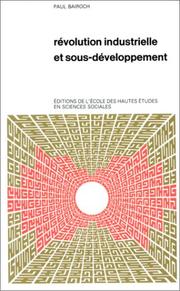| Listing 1 - 2 of 2 |
Sort by
|
Book
ISBN: 9780674047037 0674047036 0674736141 9780674736146 0674745426 0674975421 Year: 2015 Publisher: Cambridge, MA : Harvard University Press,
Abstract | Keywords | Export | Availability | Bookmark
 Loading...
Loading...Choose an application
- Reference Manager
- EndNote
- RefWorks (Direct export to RefWorks)
Rebecca L. Spang, who revolutionized our understanding of the restaurant, has written a new history of money. It uses one of the most infamous examples of monetary innovation, the assignats—a currency initially defined by French revolutionaries as “circulating land”—to demonstrate that money is as much a social and political mediator as it is an economic instrument. Following the assignats from creation to abandonment, Spang shows them to be subject to the same slippages between policies and practice, intentions and outcomes, as other human inventions. But Spang’s book is also a new history of the French Revolution, one in which radicalization was driven by an ever-widening gap between political ideals and the realities of daily life. Money played a critical role in creating this gulf. Wed to the idea that liberty required economic deregulation as well as political freedom, revolutionary legislators extended the notion of free trade to include “freedom of money.” The consequences were disastrous. Backed neither by the weight of tradition nor by the state that issued them, the assignats could not be a functioning currency. Ever reluctant to interfere in the workings of the market, lawmakers thought changes to the material form of the assignats should suffice to enhance their credibility. Their hopes were disappointed, and the Revolution spiraled out of control. Stuff and Money in the Time of the French Revolution restores economics, in the broadest sense, to its rightful place at the heart of the Revolution and hence to that of modern politics.
History of France --- anno 1700-1799 --- anno 1800-1899 --- Money --- Assignats --- Monetary policy --- Monnaie --- Politique monétaire --- Assignats. --- History --- History. --- Social aspects --- Political aspects --- France --- Economic conditions --- Politics and government --- Politique et gouvernement --- Economic history. --- Monetary policy. --- Money. --- Politics and government. --- Französische Revolution. --- Geld. --- Geldpolitik. --- Pengar --- Penningpolitik --- Ekonomisk historia. --- Politiska förhållanden --- Political aspects. --- Social aspects. --- historia. --- sociala aspekter --- politiska aspekter --- Revolution (France : 1789-1799). --- 1700-1799. --- 1700-talet. --- France. --- Frankreich. --- Frankrike. --- Assignats -- History. --- France -- Economic conditions -- 18th century. --- France -- History -- Revolution, 1789-1799. --- France -- Politics and government -- 1789-1799. --- Monetary policy -- France -- History -- 18th century. --- Money -- France -- History -- 18th century. --- Money -- Political aspects -- France -- History -- 18th century. --- Money -- Social aspects -- France -- History -- 18th century. --- Finance --- Business & Economics --- Monetary management --- Currency --- Monetary question --- Money, Primitive --- Specie --- Standard of value --- Economic policy --- Currency boards --- Money supply --- Exchange --- Value --- Banks and banking --- Coinage --- Currency question --- Gold --- Silver --- Silver question --- Wealth --- Inflation (Finance) --- Revolution (France : 1789-1799) --- E-books --- Politique monétaire

ISBN: 2719306037 9782719306031 Year: 1974 Volume: 9 Publisher: Paris: Mouton,
Abstract | Keywords | Export | Availability | Bookmark
 Loading...
Loading...Choose an application
- Reference Manager
- EndNote
- RefWorks (Direct export to RefWorks)
Industrial economics --- World history --- Third World: economic development problems --- Industrial revolution --- AA / International- internationaal --- 338.340 --- -338.8 --- -331.12 --- #SBIB:94H0 --- Revolution, Industrial --- Economic history --- Social history --- Algemene ontwikkeling in de Derde Wereld. --- Economische groei. --- Geschiedenis van de industrie. --- Geschiedenis van Europa: algemeen --- 331.12 --- 338.8 --- Geschiedenis van de industrie --- Algemene ontwikkeling in de Derde Wereld --- Economische groei --- Developing countries: economic development problems --- Industrial revolution - Great Britain --- Industrial revolution - France --- Pays en voie de developpement --- Revolution industrielle --- Politique economique --- Industrie
| Listing 1 - 2 of 2 |
Sort by
|

 Search
Search Feedback
Feedback About UniCat
About UniCat  Help
Help News
News